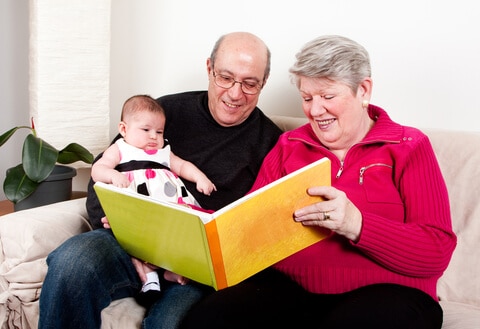by Robert E. Hornberger, Esq | Nov 21, 2013
 Child Custody determinations are a special form of legal dispute in Nassau County and Suffolk County, Long Island, NY. Although there are two official parties to the legal dispute, often the mother and the father, the unofficial third party that is the main concern of the controversy is the child. Because the child is the main concern of the courts, the method used by most states in resolving child custody disputes is what is known as the “best interests of the child” standard. Because this standard only considers the implications on the child as a neutral third party, it is technically neutral and does not favor either the mother or the father in the dispute.
Child Custody determinations are a special form of legal dispute in Nassau County and Suffolk County, Long Island, NY. Although there are two official parties to the legal dispute, often the mother and the father, the unofficial third party that is the main concern of the controversy is the child. Because the child is the main concern of the courts, the method used by most states in resolving child custody disputes is what is known as the “best interests of the child” standard. Because this standard only considers the implications on the child as a neutral third party, it is technically neutral and does not favor either the mother or the father in the dispute.
Is the “Best Interests of the Child” Standard Really Neutral?
Many professionals in the legal field would answer that the current “best interests of the child standard” is not actually neutral in practice. Statistical evidence shows that custody is disproportionally awarded to the mother of the child in most disputes. Statistically, the courts seem to believe that the mother is more often than not the party best suited to care for the child. If this were intrinsically true, there would be no dispute that awarding custody to the mother was always in the best interests of the child. In actuality, however, this is not always the case.
Why Gender Bias in Child Custody on Long Island, NY?
There are several reasons why this gender bias exists in child custody disputes.
- First and foremost, the standard used to determine custody is problematic.
- General public sentiment, and historical judicial sentiment, seems to favor mothers as guardians.
- The combination of the two creates a situation forcing the father to disprove a presumption that the mother is the better guardian, which makes it much more difficult for a father to win custody of his child.
‘Best Interests’ Standard Enables Too Much Flexibility?
Allowing courts to use the best interests of the child standard is beneficial, as it allows for flexibility in child custody decisions. Custody disputes are complicated and unique situations. Allowing judicial discretion in a standard allows the courts to tailor decisions to each unique circumstance. However, this flexibility may also be the downfall of the “best interests of the child” standard. Because a flexible standard lacks objective elements or factors, the ultimate determination lies in the opinion of the individual adjudicating the dispute. Consequently, if a judge, mediator, etc. lacks objectivity; it is his or her opinion that decides the fate of the child.
Discretion Favors Mothers over Fathers in Child Custody Disputes
Such wide discretion would not be problematic if public and judicial sentiment with respect to custody matters were different. However, the general public outlook on custody-related matters seems to be that mothers are naturally better caretakers to their children than fathers. Furthermore, a history of judicial decisions shows that judges share this particular attitude with the public as well. Some courts have even explicitly stated that if all circumstances were equal between the mother and the father, the mother should be awarded custody. Matthew B. Firing, In Whose Best Interests? Courts’ Failure to Apply State Custodial Laws Equally Amongst Spouses and Its Constitutional Implications, 20 Quinnipiac Prob. L.J. 223, 249 (2007). This effectively creates a rebuttable presumption that the mother, all other things being equal, is the better caretaker. As a result, instead of being judged by an equal standard, an unfair burden of proof is placed on the father in custody disputes. With a presumption that the mother is the better custodian, the father is placed in the position of having to prove that the mother is an unfit parent. The “best interests of the child” are considered, but in a different way than intended. The judge is not actually considering, objectively, which parent provides the best situation for the child, but whether the father has proven that the mother is unable to provide the best possible environment for the child.
Gender Bias Due Process Claims Unsuccessful
In addition, gender-biases in child custody determinations implicate several constitutional issues under the Equal Protection Clause and the Due Process Clause. Courts have interpreted the Equal Protection Clause to apply to gender-based inequalities, and the Due Process Clause to protect a fundamental right to privacy in family matters. Child custody has been assumed to be a fundamental right under the Due Process Clause. Although these clauses may seem to give legal merit to a father’s challenge of gender bias in the best interests of the child standard, these challenges have been historically unsuccessful.
“Best Interests” Standard Not Fairly Applied to Fathers
Gender bias in child custody disputes is prevalent, as mothers are awarded custody of their children disproportionately more than fathers in judicial proceedings. While the “best interests” standard is a good method to gauge the best environment for the child involved in a custody dispute, the standard is not always properly and fairly applied by the courts. Therefore, it may be time to reevaluate our societal outlook on child custody and make some real changes that would result in more equitable decisions for fathers.
Questions About Child Custody and Visitation on Long Island?
See this page to learn everything you need to know about Child Custody and Visitation on Long Island.
To learn more about what you need to know about Child Custody on Long Island, visit this page on Child Custody or contact us at 631-923-1910 for a complimentary consultation.
Long Island, NY Child Custody Questions?
Call Us. We’re Here to Help in Nassau & Suffolk
The law firm of Robert E. Hornberger, Esq. P.C. has regularly and successfully represents both mothers and fathers in Child Custody disputes in Nassau County and Suffolk County courts on Long Island. If you have questions about your Child Custody case, give us a call at 631-923-1910 or fill out the short form on this page for a free, complimentary consultation where we can discuss your case and advise you on the best way forward. We’re here to help.
by Robert E. Hornberger, Esq | Nov 7, 2013
 As a divorce attorney working on Child Custody cases in Nassau County and Suffolk County on Long Island, NY, I’ve seen first-hand that following the dissolution of a marriage, it is not uncommon for former spouses to relocate away from the marital neighborhood. There are as many varied reasons for this as there are people: some wish to pursue other career opportunities, while others choose to move closer to family and friends in order to re-establish a support network post-divorce.
As a divorce attorney working on Child Custody cases in Nassau County and Suffolk County on Long Island, NY, I’ve seen first-hand that following the dissolution of a marriage, it is not uncommon for former spouses to relocate away from the marital neighborhood. There are as many varied reasons for this as there are people: some wish to pursue other career opportunities, while others choose to move closer to family and friends in order to re-establish a support network post-divorce.
Heated Disputes over Child Custody
While it’s perfectly natural and understandable that people want to, or have to, move, it can become an issue when the former spouses have children together. Although many parents have their children’s best interests in mind when making the decision to relocate, choosing to do so often leads to heated disputes between the parents regarding Child Custody. It can become most heated when the moving parent is the one who has custody of the child or children. That parent feels as if they should be able to relocate freely, while the other parent may feel that the access they have to their children should not be compromised. Consequently, the relocation of one parent frequently triggers the filing of petitions for modification of child custody orders. In order to address the issue of parent relocation, many states consider what is in the best interests of the child.
Relocation May Require Modification of Child Custody Agreement
In the 2002 issue of the American Law Institute (ALI) Principles on the subject of parental relocation, the guidelines suggested that relocation should not be considered a substantial change in circumstances warranting the modification of a child custody order. However, the ALI acknowledged that there should be a general exception to this standard where the relocation of the parent would “significantly impair” the visitation arrangement had between the parties. The Principles also establish, however, that a parent should be allowed to relocate if that parent engages in “the clear majority of the custodial responsibility,” and has a valid reason for the relocation. The ALI provides a list of examples as to what should constitute valid reasons for relocation.
Some Valid Reasons for Relocation:
- Pursuit of career opportunities
- Educational opportunities
- Relocating after remarriage
New York Puts Restrictions on Relocation
Presently, many jurisdictions, including New York, have departed from the notion that parents should be able to relocate freely, and have instead opted to determine matters of relocation on a case-by-case basis. The New York Court of Appeals case, Tropea v. Tropea, for instance, stated that, “each relocation request must be considered on its own merits … with predominant emphasis being placed on what outcome is most likely to serve the best interests of the child.” 665 N.E. 2d. 145, 150-51 (N.Y. 1996).
Less than Half of All Relocation Requests Granted by Courts
In the article, Still Partners? Examining the Consequences of Post-Dissolution, Professor Theresa Glennon addresses the topic of which approach to parental relocation ought to be adopted by all states. Glennon points out that very few states assess the interests of the parent seeking relocation. However, she notes that there are some states that will take the parent’s interests into consideration, as the parent’s wellbeing will ultimately have a large impact on what is in the best interests of the child. In many long distance relocation cases, courts are extremely reluctant to grant permission to the party seeking relocation and have in more cases than not, declined to do so. According to Glennon, “Courts granted permission to move in slightly fewer than half-forty-nine percent of the cases [studied] in which a final decision was made.”
Best Interests of the Child Must Be Considered in Relocation Requests
In assessing the best interests of the child standard, all jurisdictions express mixed feelings as to whether children should be relocated away from one of their two parents. Courts have taken into consideration parental happiness, presuming that this factor ultimately benefits the child. However, courts also consider the alternatives that would bear the least detriment to the child’s psychological wellbeing and development. Therefore, many jurisdictions require the relocating party to meet a high burden of proof to establish that moving would be in the best interests of the child. The burden then shifts to the non-relocating party to prove the contrary; that relocation would not be in the child’s best interests. The primary residential custodian often has a fundamental advantage in terms of meeting the burden of proof necessary for relocation in many jurisdictions.
Best Interests of the Child Difficult to Determine in Relocation
It is very common for parties to relocate following a divorce. However, relocation can become very difficult when Child Custody is involved. Parents hoping to rebuild their lives post-divorce feel as if they are entitled to relocate freely, while non-relocating parents feel that the relocation of the other parent would substantially inhibit their ability see their children and be involved in their lives. In order to address this issue, many jurisdictions utilize the best interests of the child standard, although it is not always clear how that is best determined.
Questions About Child Custody and Visitation on Long Island?
To learn more about what you need to know about Child Custody on Long Island, visit this page on Child Custody or contact us at 631-923-1910 for a complimentary consultation.
Give Us a Call; We’re Here to Help Your Nassau, Suffolk, Long Island, NY Child Custody Case
The Long Island Divorce and Family Law Attorneys at Hornberger Verbitsky, P.C. are experienced divorce, family law and child custody attorneys. If you have any question about your rights as a parent and child custody, we’re here to help. Give us a call at 631-923-1910 or fill out the short form on this page to schedule a free consultation where we can discuss the specifics of your case and help you determine how to best move forward.
by Robert E. Hornberger, Esq | Sep 5, 2013
 As a Long Island Divorce Attorney and Child Support Attorney, I am often asked the question, “If I share custody of the children, do I have to pay child support?” or “Will I receive child support in a shared custody situation?” There is a common misconception in Nassau County and Suffolk County child support cases that there is no obligation to pay child support where two parties “share” custody or “share” equally in parenting time. Because the Child Support Standards Act is silent on the matter of shared custody, it is not surprising that this question has been litigated several times in the State of New York.
As a Long Island Divorce Attorney and Child Support Attorney, I am often asked the question, “If I share custody of the children, do I have to pay child support?” or “Will I receive child support in a shared custody situation?” There is a common misconception in Nassau County and Suffolk County child support cases that there is no obligation to pay child support where two parties “share” custody or “share” equally in parenting time. Because the Child Support Standards Act is silent on the matter of shared custody, it is not surprising that this question has been litigated several times in the State of New York.
In 1998, the New York Court of Appeals formally recognized that the Child Support Standards Act does in fact apply to cases of shared custody. In the case of Bast v. Rostoff, the Court of Appeals attempted to reconcile a shared custody agreement with the Child Support Standards Act, as the lower court acknowledged, “[t]he concept of shared parenting time does not appear anywhere in the statute.” 91 N.Y.2d 723, 725 (1998). (more…)

by Robert E. Hornberger, Esq | Jul 18, 2013
Contrary to popular belief, Joint Child Custody is not the standard on Long Island or in New York State. This fact often leads to Contested Child Custody cases in Nassau County or Suffolk County Court when both parents seek Sole Child Custody.
The Role of the Forensic Evaluator in Contested Child Custody
 When both parents seek custody of the child the standard in Nassau County and Suffolk County Courts is to act in the “best interests of the child.” Often, the court will appoint what is known as a Forensic Evaluator or other mental health professional to help determine the best interests of the child. The forensic evaluator can be a psychiatrist, psychologist, or social worker. The forensic evaluator will meet with nearly everyone in the child’s life, including but not limited to:
When both parents seek custody of the child the standard in Nassau County and Suffolk County Courts is to act in the “best interests of the child.” Often, the court will appoint what is known as a Forensic Evaluator or other mental health professional to help determine the best interests of the child. The forensic evaluator can be a psychiatrist, psychologist, or social worker. The forensic evaluator will meet with nearly everyone in the child’s life, including but not limited to:
- The child him or herself
- The child’s siblings
- The child’s parents
- Friends of the parents
- Any other mental health professionals with whom the child may be involved
The evaluator will meet with the child alone and also observe the child interacting with each parent. The evaluator plays a very important role in determining the best interests of the child because the court will often weigh the forensic evaluator’s report heavily in its determination of what is in the best interests of the child.
Controversy Over Forensic Evaluators in Nassau & Suffolk County Courts
The forensic evaluator’s role in the child custody process on Long Island has become increasingly controversial. The forensic evaluator’s report can have tremendous influence upon the judge’s ruling and the forensic evaluator can be called as a witness in the child custody proceedings. However, the attorneys for either parent are not permitted to speak with the evaluator and attorneys argue that there is no consistent standard for how much access either side in the Child Custody case can have to the reports.
3 Legal Challenges to Create a Consistent Standard
Recently, there were three major proposals presented to the Office of Court Administration, which is the office in control of the rules regarding access to the reports by attorneys and their clients. The three proposals came from the New York State Bar Association (NYSBA), the Family Court Advisory and the Family Court Advisory Rules Committee (FCARC), and the Matrimonial.
NYSBA Proposal: Everybody Gets a Copy
The NYSBA proposes that counsel for each party and counsel for the child are each permitted to receive a copy of the report and the report remain confidential. In addition, NYSBA proposed that the court have the discretion to permit each party to have a copy of the report to read and take notes on in a secure location. If the party had counsel this would be done at the attorney’s office and if the party were a pro se litigant it would most likely be done at the courthouse.
Matrimonial Committee Proposal: Further Non-Disclosure
The proposal by the Matrimonial Committee is similar to the NYSBA proposal; with an additional step requiring counsel for each party to execute an affirmation of further non-disclosure. If a party is unrepresented they will also have to execute an affirmation of further non-disclosure.
FCARC Proposal: Case-by-Case
The FCARC proposal takes a case-by-case basis approach, where the court will determine how much access the parties will have to the report and it will be applied equally to each party as well as parties without counsel.
FCARC Favored
There is heavy favor for the case-by-case approach submitted by FCARC because it allows for the most judicial discretion and flexibility, but the Office of Court Administration has stated it is unsure when a decision will be made.
Outcome will Effect Parents and Children on Long Island
In any event, this is a serious development in Contested Child Custody cases in Nassau County and Suffolk County courts on Long Island whose outcome will affect parents and their children for years to come.
Questions About Child Custody and Visitation on Long Island?
See this page to learn everything you need to know about Child Custody and Visitation on Long Island.
To learn more about what you need to know about Child Custody on Long Island, visit this page on Child Custody or contact us at 631-923-1910 for a complimentary consultation.
We’re Here to Help with Child Custody in Nassau County and Suffolk County
The Long Island Child Support Attorneys and Child Custody Lawyers at Robert E. Hornberger, P.C. have successfully assisted many families in Nassau County and Suffolk County with their Child Support or Child Custody cases. Contact us at 631-923-1910 or fill out the short form on this page and we will be happy to demonstrate how we can help during a free consultation.
by Robert E. Hornberger, Esq | Jun 20, 2013
Actions Now Can Affect Your Child Custody in Nassau County & Suffolk County Courts
 As Divorce Attorneys practicing on Long Island, we see many critical mistakes that occur at the beginning or before a divorce case is even filed that put many parents at a disadvantage when it comes to their ability to have Child Custody with their children when the divorce is finalized.
As Divorce Attorneys practicing on Long Island, we see many critical mistakes that occur at the beginning or before a divorce case is even filed that put many parents at a disadvantage when it comes to their ability to have Child Custody with their children when the divorce is finalized.
Long Island Child Custody Mistake #1
One of the biggest and most common mistakes a parent living in Nassau County or Suffolk County can make is to move out of the marital/joint residence and leave your child with the other spouse. This essentially gives away custody to the residential parent. If want to retain custody of your child or children, you cannot move out of the home without your child, period. No matter how bad the situation is with your partner, in the Nassau County or Suffolk County court system, if you leave without the child, you essentially give up Child Custody.
Long Island Child Custody Mistake #2
If you do decide that you must move out of the joint residence with the children, make sure you get your spouse’s consent to do so. This does not necessarily have to be a formal written agreement; you can simply ask your spouse in an email to respond to your request to move out with the children. If your spouse consents via a reply email, it amounts to a virtual statement by your spouse that you are the child’s or children’s primary caregiver.
Long Island Child Custody Mistake #3
Conversely, if you are the parent remaining in the marital home and you give permission to your spouse to leave with the children, you are telling the Nassau County and Suffolk County courts that your spouse is the child or children’s primary caregiver.
Protect Your Child Custody Rights Now
As experienced divorce attorneys practicing on Long Island, we recognize that preventing your spouse from moving out of the marital home with the children is more difficult to control than staying in your residence, however, there are steps you can take to protect your Child Custody rights. First, as soon as it is clear that you and your spouse are getting divorced, make it absolutely clear to your spouse that it’s not okay with you for them to take the children. This too can be done through texts and emails. Make it clear that your spouse is free to leave the marital home, but your children must remain until your divorce and child custody case is fully resolved.
File for Divorce Early in Nassau or Suffolk County Court to Protect Yourself
As soon as you realize that your marriage is ending, it is a good idea to file for a divorce. The filing of a divorce petition, protects your Child Custody rights, should your spouse attempt to move out of the joint residence and take the children without your consent. With a pending divorce case, you will have the right to seek emergency relief requesting that the children be returned to their home. Of course, in such a case, it is important to have a record that you do not consent to the other spouse removing the children from their home.
Questions About Child Custody and Visitation on Long Island?
See this page to learn everything you need to know about Child Custody and Visitation on Long Island.
To learn more about what you need to know about Child Custody on Long Island, visit this page on Child Custody or contact us at 631-923-1910 for a complimentary consultation.
We’re Here to Help with a Free Consultation
The Long Island Child Support Attorneys and Child Custody Lawyers at Robert E. Hornberger, P.C. have successfully assisted many families in Nassau County and Suffolk County with their Child Support or Child Custody cases. Contact us at 631-923-1910 or fill out the short form on this page and we will be happy to demonstrate how we can help during a free consultation.
by Robert E. Hornberger, Esq | Jun 6, 2013
Long Island NY Courts Can Give Grandparents Visitation Rights
 The United States Supreme Court has declared that grandparents do not have an automatic right to visit their grandchildren. However, it does leave room for states to consider the impact of the decision by the parents to remove the grandparents from the life of the child and whether or not it’s in the child’s best interest. This type of situation is very emotional to both the child and the grandparents. There are many situations where the grandparents could have been, at some point, the caretakers of the child. In that situation, the Grandparents could potentially make a case to see the children on a more regular basis through Child Visitation rights, or something to that effect.
The United States Supreme Court has declared that grandparents do not have an automatic right to visit their grandchildren. However, it does leave room for states to consider the impact of the decision by the parents to remove the grandparents from the life of the child and whether or not it’s in the child’s best interest. This type of situation is very emotional to both the child and the grandparents. There are many situations where the grandparents could have been, at some point, the caretakers of the child. In that situation, the Grandparents could potentially make a case to see the children on a more regular basis through Child Visitation rights, or something to that effect.
Courts Reluctant to Intrude in Parents’ Rights
In general, the courts are reluctant to intrude on a parent’s right to raise their children without state interference. However, in New York State, Grandparents can attempt to obtain visitation rights or custody under NY DRL § 72. Under this statute, if the Grandparents can show the existence of extraordinary circumstances, they can commence a special proceeding for a Writ of Habeas Corpus to have the child brought before the court. In this situation, grandparents can try to show the courts that if extenuating circumstances occur, it would be in the best interests of the child for the grandparents to have Visitation rights, and in extreme circumstances, Child Custody. The statute also allows for the parties to enter into a consensual Child Custody agreement if the existence of extraordinary circumstances does not exist.
Questions About Child Custody and Visitation on Long Island?
To learn more about what you need to know about Child Custody on Long Island, visit this page on Child Custody or contact us at 631-923-1910 for a complimentary consultation.
Questions About Grandparent’s Rights? Contact Us
If you have any questions regarding Grandparent’s Rights in Child Custody or Visitation cases, give us a call at 631-923-1910. The divorce and family law office of Robert E. Hornberger, P.C. will be pleased to offer you a free complimentary consultation to discuss your options. We’re here to help you.
by Robert E. Hornberger, Esq | May 2, 2013
Protect Your Children During Your Divorce
 It’s unfortunate, but as a Long Island divorce attorney, I see the negative effects of divorce on children nearly every day. It’s no secret that kids can be adversely affected by a divorce, particularly when parents allow their own anger at their spouse to be directed or funneled through their children. What parents don’t always understand is that it is often their own actions that cause the trauma of divorce to be taken out on their children.
It’s unfortunate, but as a Long Island divorce attorney, I see the negative effects of divorce on children nearly every day. It’s no secret that kids can be adversely affected by a divorce, particularly when parents allow their own anger at their spouse to be directed or funneled through their children. What parents don’t always understand is that it is often their own actions that cause the trauma of divorce to be taken out on their children.
A recent article by Kara Bishop for the Huffington Post, revealed the results of a surveyed number of children whose parents are going through a divorce and what rules they would prefer their divorcing parents follow. From my own experience as a divorce attorney on Long Island, I can tell you that Ms. Bishop is right: parents often don’t realize the pain they inflict on their children by using them as quasi-pawns in their divorce.
You must make an effort to keep your children out of the divorce equation as much as possible, before, during and after your divorce. Attempting to influence your child against your spouse is likely to backfire and cause resentment against you and can cause severe emotional distress in your child.
While you may harbor deep anger and resentment at your spouse, you should do your best to keep this from your children. You should, at all costs, keep yourself from pressuring your children to choose sides or make them feel guilty for wanting to see their other parent. It can cause serious damage to a child’s psyche to be utilized as a game piece at any time during and after your divorce. You must do your absolute best to remain cordial and respectful to your spouse or ex-spouse in front of your children at all times. Not doing so makes you look bad in front of your child and teaches them that you are not willing or able to put them first.
Children can suffer immense pain watching their parents go through a divorce if their parents let them. Couples need to take extra care to make sure their children do not feel “used” or any less loved just because their parents are no longer married.
Contact Us for More Information
There are a number of methods and strategies to obtaining a divorce. Some divorce methods, like divorce mediation, can sometimes be beneficial to helping you and your spouse maintain a more positive relationship for your children during and after your divorce. If you have any questions regarding how to best protect your children during your divorce, give us a call at 631-923-1910. The divorce law office of Robert E. Hornberger, P.C. will be pleased to offer you a free complimentary consultation to discuss any aspect of your divorce.
by Robert E. Hornberger, Esq | Dec 4, 2012
Child Custody: Sole, Joint, Legal, Residential, Shared, Split…. What does it all mean?
 As a child custody lawyer on Long Island, NY, I am often asked the difference between the different types of child custody in Nassau County and Suffolk County, where most of my clients reside. Child custody laws are universal throughout New York State so the discussion below applies throughout the state.
As a child custody lawyer on Long Island, NY, I am often asked the difference between the different types of child custody in Nassau County and Suffolk County, where most of my clients reside. Child custody laws are universal throughout New York State so the discussion below applies throughout the state.
First of all, there are two main aspects to child custody: Residential Custody and Legal Custody.
Residential Custody
Residential Custody refers to which parent the child lives with more of the time. This parent is often referred to as the “residential” or “custodial” parent. This is an important distinction for a couple of reasons:
- The residential parent usually (but not always) receives child support from the noncustodial parent.
- If the parents reside in different school districts, the child(ren) will attend school (referring to public school) in the school district in which the residential parent resides.
Legal Custody
Legal Custody refers to the right to make decisions on behalf of the child(ren). This generally refers to the right make major decision pertaining to the child(ren)’s health, education or general welfare. When you hear that a parent has “sole” custody, this means that the parent is the residential parent, and, has the singular right to make major decisions for the child(ren) despite protest from the noncustodial parent. Joint custody means that both parents have to be involved in and agree upon all major decisions for the children.
Shared Custody
Shared Custody is similar to joint custody in the decision making aspect, however, parents who agree to “share” custody do not designate a custodial parent. Instead, the parents agree to share the child(ren) as equally as possible. Under “shared” custody, there is still a child support obligation, however, it is paid from the parent who earns more money to the parent who earns less money.
Split Custody
Split Custody refers to families with more than one child where at least one or more of the children reside with each parent.
Child Custody and Child Support
Child custody and child support arrangements for every divorcing couple is unique and needs to account for your individual family’s needs. For a free private consultation about your family’s needs, contact the experienced attorneys at Robert E. Hornberger, PC at 631-923-1910 or fill out the form on this page and we’ll get right back to you.
 Child Custody determinations are a special form of legal dispute in Nassau County and Suffolk County, Long Island, NY. Although there are two official parties to the legal dispute, often the mother and the father, the unofficial third party that is the main concern of the controversy is the child. Because the child is the main concern of the courts, the method used by most states in resolving child custody disputes is what is known as the “best interests of the child” standard. Because this standard only considers the implications on the child as a neutral third party, it is technically neutral and does not favor either the mother or the father in the dispute.
Child Custody determinations are a special form of legal dispute in Nassau County and Suffolk County, Long Island, NY. Although there are two official parties to the legal dispute, often the mother and the father, the unofficial third party that is the main concern of the controversy is the child. Because the child is the main concern of the courts, the method used by most states in resolving child custody disputes is what is known as the “best interests of the child” standard. Because this standard only considers the implications on the child as a neutral third party, it is technically neutral and does not favor either the mother or the father in the dispute.


















